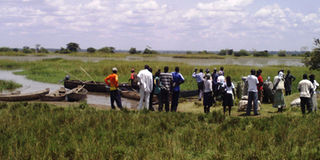Tisai, the virgin tourist destination with no social amenities

The landing site to the island. The most reliable means of transport is by water. Photo by Richard Otim.
What you need to know:
There is no school, no health facility or even fresh water source in this island and yet it is home to more than 6,000 residents.
Gilbert Okwakol, a 13-year-old orphan in Tisai island, Kumi District, had just enrolled for primary education early this year when his dream to learn and write from a local school suddenly vanished.
A community school, which parents on the island had initiated for children of school-going age, was closed and there was nowhere he could go to, to continue with his education.
“Teachers left us because they were not paid salaries. All the pupils remained home and the school has stopped operating,” Okwakol said.
He said each of the pupils enrolled at the school was supposed to contribute Shs10,000 each term towards remuneration of the teachers but many parents could not even afford that.
“I was determined to pay that money myself because I wanted to learn how to write my name. I would fish in the evenings and save what I got from selling my catch. But other parents pulled their children out and the school closed,” said Okwakol.
A volunteer with Media Against Poverty (MAP), a Community Based Organisation spearheading efforts to put up a primary school in the area, Zebulon Ejomu, said a total of 184 pupils had been mobilised early this year to enroll for classes but all of them have abandoned school.
Tisai’s island problems do not end with having no school. The island has no safe water points or public health facility and expectant mothers here have to rely on traditional birth attendants for antenatal care.
It is not that the island is a desert or without any potential to grow. Ejomu, for example, says Tisai has good soils which are suitable for seed multiplication. It also has a high potential to become a tourist destination. A Uganda Wild Life (UWA) official, Charles Okuta said the island is one of the gazzetted bird sanctuaries in the country and home to some of the most endangered bird species.
He said the island is part of Opeta-Bisina wetland system, uniquely placed and a haven to the rare fox’s weaver, shoebill and white-bucket duck.
“The island is ideal for eco-tourism but lacking in good infrastructure,” Okuta said adding that the island is able to offer a variety of tourism interests including boat rides, birding, fishing and shoebill trekking. But all these have never been tapped, and with the serious lack of amenities, disease is rife, as Ejomu points out.
“The HIV/Aids threat is very serious here and literacy rates are alarming,” he says.
With a population of more than 6,000 people, the 85 square kilometre island located in Ngero Sub County has never benefitted from any of the government’s programmes such as the Universal Primary Education.
“These people are cut off from the basic amenities and the only available means of transport is by water,” an elder on the island, John Justine Okuku said.
Okuku says most parents on the island depend on relatives or friends at the mainland where they take their children to stay as they go to school there.
“If you do not have a place where your child can stay as she (he) goes to school away from the island, then it becomes very difficult. Government has failed to put up a school for our children,” Okuku said.
The LCII chairperson, Peter Omongot said the last time the government operated a health facility on the island was in 1958, but this stopped because of the disturbances by Karimojong cattle rustlers.
In 1967 Karimojong warriors invaded the island raiding almost all the cattle and since then, the inhabitants have lived like they are in a forgotten part of the world.
“Are we really in Uganda? During elections we participate and candidates promise us many things but none has ever been fulfilled,” a local, Wilson Okoboi said.
With no established infrastructure running on the island, it has become more difficult to put in place a law enforcement facility to curb increasing cases of crime.
Ongiino Sub County LC3 chairperson, Adome Kizito said efforts to establish a police post on the island have been futile and police authorities say it is insecure for them to put up a unit for the force in the area.
“In times of disaster such as during famine, people on this island are never considered. They have to move to the nearest districts to get something for themselves,” Adome said.
The island does not even have a polling station and during elections the eligible voters have to travel to the mainland to vote.
“We vote but no services are brought (close) to us. Some of us have died because of childbirth complications because there is no maternity unit. Why can’t government listen to our cry?” a local resident, Angela Oumo asks.
The residents have tried to find ways themselves to better their lives such as putting up a school, but unless they are given support by the government, it will take them longer to realise the dreams they have for the island.




